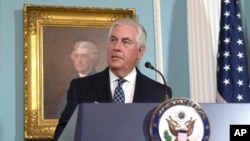The U.S. State Department has placed Pakistan on a “Special Watch List” for “severe violations of religious freedom,” at the same time it announced cuts to security assistance to that country.
“The protection of religious freedom is vital to peace, stability, and prosperity. These designations are aimed at improving the respect for religious freedom in these countries,” a State Department statement said Thursday, as the United States redesignated 10 other nations as “countries of particular concern” under the International Religious Freedom Act.
State Department spokesperson Heather Nauert confirmed Thursday that Washington is suspending security assistance to Pakistan until Islamabad takes action against terrorist organizations, including the Haqqani Network.
Earlier this week, the White House said Islamabad would have to do more to combat terrorism to receive U.S. aid. The Pakistani ambassador to Washington, Aizaz Ahmad Chaudhry, while speaking to VOA, called for the two countries to remain engaged with each other and avoid steps that could create tensions and destabilize the region.
The Pakistani ambassador to Washington, Aizaz Ahmad Chaudhry, while speaking to VOA, called for the two countries to remain engaged with each other and avoid steps that could create tensions and destabilize the region.
While putting Pakistan on the international religious freedom blacklist itself is a normal process, experts said the timing is "very ominous."
While putting Pakistan on the international religious freedom blacklist itself is a normal process, experts said the timing is “very ominous.”
“I think this is a reflection of the overall frustration of the United States with Pakistan,” the Atlantic Council’s South Asia Center director, Bharath Gopalaswamy, told VOA Thursday.
“That said, Pakistan has not been a great place for other religious minorities and there has been consistent targeting of minorities,” Gopalaswamy said. “Various religious sects have been victims of violence.”
Moeed Yusuf, associate vice president of the United States Institute of Peace, said there is a consensus within the Trump administration that it would increase pressure on Pakistan.
Yusuf added the U.S. plan to cut security assistance to Pakistan is “a done deal,” but it will not change Pakistan’s approach on counterterrorism and what Washington is seeking from Islamabad.
“There is no champion of the U.S.-Pakistan relationship to speak of now in this administration,” he said.
Separately, the U.S. State Department redesignated 10 countries, including Myanmar, China, Iran and North Korea, as “countries of particular concern” for having engaged in or tolerated violations of religious freedom.
Eritrea, Sudan, Saudi Arabia, Tajikistan, Turkmenistan and Uzbekistan also were on the list, the State Department said.
“We recognize that several designated countries are working to improve their respect for religious freedom; we welcome these initiatives and look forward to continued dialogue,” said Nauert, the State Department spokesperson.
The chairman of the House Committee on Foreign Affairs, Ed Royce, (R-CA) said the redesignation of Myanmar as a country of particular concern is particularly appropriate, given its military’s ethnic cleansing of Rohingya Muslims. Royce, did, however, say he wanted Vietnam to be on the list.
“However, I am troubled that Vietnam was again not designated this year. The Vietnamese people continue to have their religious freedom and other human rights violated. The U.S. should never shrink from calling out countries for such abuses,” added Royce.
The chairman of Pakistan's Senate Committee on Defense Production reacted to the U.S. move by saying, "Religious freedom ...is embedded in our constitution." Senator Abdul Qayyum went on to tell VOA's Urdu Service the U.S. is taking the action to meet its own goals. "If these sanctions have been put in place because of religious reasons, then why wasn't it done four months ago, two years ago, 10 years ago," he said.
A member of Pakistan's Christian community, Joseph Robinson, said Pakistan's government provides religious freedom for its citizens. "...There are Christians, Hindus, they can independently pray, can speak their mind," he said.
Scholar, Dr. Obaid Ullah noted he was able to attend Christmas church services in Pakistan with his family. "If we were scared we wouldn't be able to do that," he said, adding, ..."if we are being stopped from something, we are not given our rights ...we will come on the streets ...we would protest.





